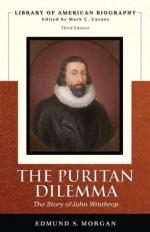|
This section contains 9,625 words (approx. 33 pages at 300 words per page) |

|
SOURCE: "Winthrop's Journal: Religion, Politics, and Narrative in Early America," in Religion and the Life of the Nation: American Recoveries, edited by Rowland A. Sherrill, University of Illinois Press, 1990, pp. 235-58.
Here, Moseley discusses the ways in which the tone of Winthrop's journal changes from a mere recording of historical fact to a personal, self-conscious narrative.
John Winthrop has often been portrayed as a self-righteous martinet, a Puritan dictator whose love for power was matched only by his unthinking Calvinist orthodoxy. Yet reading his three-volume Journal enables us to recover a more credible, if more complicated, image of the foremost founder of the Massachusetts Bay Colony. Several years ago historian Edmund Morgan wisely eschewed the authoritarian caricature and, instead, cast Winthrop [in The Puritan Dilemma, 1958] as representative of "the Puritan dilemma," that characteristic tension between the transcendent exuberance of an awakened spiritual life and the mundane requirements of...
|
This section contains 9,625 words (approx. 33 pages at 300 words per page) |

|


